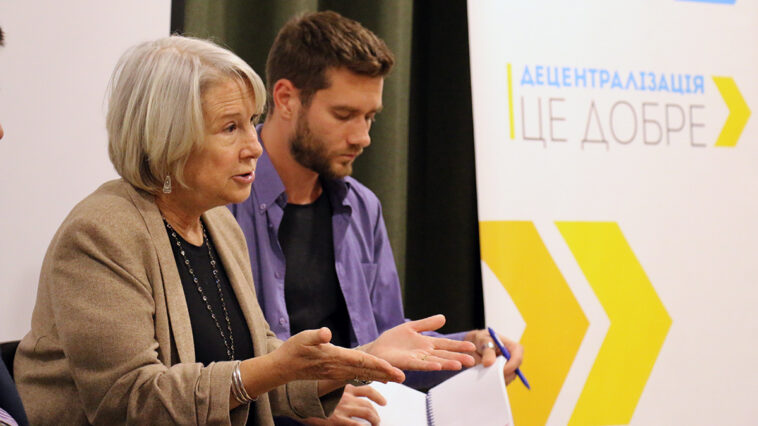How do international organizations support communities today? Why is it important to support local businesses? What challenges do communities face today? These topics community leaders from seven Oblasts of Ukraine discussed during their meeting with Ms Carrie Hessler-Radelet, President of Global Communities.
Ms Carrie Hessler-Radelet, on her current visit to Ukraine, met with the leaders of 12 communities and local Military Administrations from Zaporizhzhia, Mykolaiv, Kropyvnytskyi, Dnipropetrovsk, Chernihiv, Kherson and Kharkiv Oblasts. The USAID DOBRE’s Chief of Party, Mr Brian Kemple, and the USAID DOBRE’s Deputy Chief of Party, Mr Maksym Burdavitsyn, also attended the meeting.
The President of Global Communities spoke about the Organization’s work in Ukraine:
“We assist in Ukraine through the PEARL Program, which supports small and medium-sized businesses in Ukraine, as well as the CLEAR, which transfers humanitarian aid, and of course, the DOBRE Program, designed to strengthen local governments. There are similar programs in 30 countries that, for one reason or another, need help. People in the United States and all around the world are sensitive to Ukraine’s problems. We remember about Ukraine despite other conflicts taking place in the world.”
According to Ms Carrie Hessler-Radelet, the work of community leaders in Ukraine is impressive:
“I have experience managing a federal agency, but I think the mayor’s job is even harder. There is a saying in the US that all politics is local. After all, you are the first to face problems and try to find ways to solve them. Everything starts at the local level. I can’t even imagine all the problems you face in such a difficult time for the country. I am amazed that you can find the strength to continue to fulfill your duties against all odds,” said Ms Carrie Hessler-Radelet, President of Global Communities.
The conversation between the community leaders and Ms Carrie Hessler-Radelet centered around stories of struggle, mutual assistance, and new challenges the de-occupied and frontline communities face.
Ms Lyudmyla Tkachenko, Head of Novhorod-Siverska community of Chernihiv Oblast, thanked Ms Carrie for the equipment they received from the USAID DOBRE Program as part of the Emergency Response to the challenges of the war. The public official also said that after the de-occupation, the authorities faced the problem of the lack of shelters or dormitories. The northernmost community of Ukraine is almost 100 kilometers long. The local authorities help people from border villages settle in a safer area within the community. However, there is not enough housing for everyone.
Mr Oleh Pylypenko, Head of Shevchenkivska community of Mykolayiv Oblast, located between the cities of Mykolaiv and Kherson, told the story of his community:
“For eight and a half months, the community was on the front line, and its part was under the occupation. Many civilians took up arms and helped the military to hold the front. Decentralization is the most successful reform in Ukraine. Thanks to it, most people associate their home with their community and stand up for it.”
Mr Oleh Pylypenko added that the communities, close to the front line, need restoration, and the assistance of international partners is crucial. There were such challenges among those listed by the head of community: many staff members have left the community, and it is necessary to bring in or train English-speaking project managers to attract additional funds. Also, relocated businesses are often not ready to return to the de-occupied territories and those requiring reconstruction because they have already settled in a new place. Mr Oleh Pylypenko says that the time of rebuilding such communities is ideal for a foreign investor to build production in Ukrainian communities. The negotiation process can begin now because the communities have investment-attractive locations and can offer economically favorable conditions for investors.
Mr Dmytro Neveselyi, Head of Zelenodolska community of Dnipropetrovsk Oblast, told how people helped to stop the Russian troops’ advance, and now the community is struggling with new challenges of the war:
“Today, we face a new challenge – water supply. I am grateful to the USAID DOBRE Program for keeping their finger on the pulse and helping us solve urgent issues. The war destroyed over 70% of our infrastructure, but almost 90% has already been rebuilt. Business has remained, but it is in a difficult situation. Many entrepreneurs were in the agricultural sector, breeding fish and producing black caviar. The snail farm was one of the top five in Ukraine. We need materials to lay water supply and irrigation networks for the fields to restore business and jobs. The USAID DOBRE Program quickly got engaged in this work by providing us with some pipes and an excavator.”
However, according to Mr Dmytro Nevesely, this is only 10% of what elimination of the problem requires. Now, as 97% of the population has returned to the community, local authorities are trying to help, protect, and restore the businesses with the help of partners.
“Thank you for what you are doing for Ukraine. Now, our main task is to bring people back home. And we will confirm that we are a European state,” added Mr Dmytro Neveselyi.
“I am taking the issue of restoring Ukrainian business and many of your other requests with me. I am bringing all your stories home to the United States to the authorities that can help resolve these issues. I want to add that Americans support Ukraine. There are flags of Ukraine on many buildings from Washington to my native Michigan. In my life, I have never seen such support from Americans for any country,” added Ms Carrie Hessler-Radelet, President of Global Communities.
During her visit to Ukraine, Ms Carrie Hessler-Radelet met with representatives of the Government of Ukraine and took part in the events, organized with the support of international technical assistance programs and partner NGOs. The head of Global Communities will also visit several communities in Chernihiv Oblast, where all three programs of the international organization are represented in Ukraine: the USAID DOBRE, the USAID/BHA CLEAR, and the PEARL Programs.

